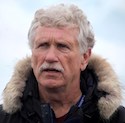By: Athena E. Copenhaver, Assistant Director of the Study of Environmental Arctic Change (SEARCH) ; Brendan P. Kelly, Director and Chief Scientist of SEARCH; and George W. Kling, Professor of Ecology and Evolutionary Biology at the University of Michigan

The National Science Foundation's Office of Polar Programs recently funded the University of Alaska Fairbanks and six other institutions to synthesize what is known about the changing Arctic environment and its consequences.
Over the next five years, the Study of Environmental Arctic Change, known as SEARCH, will bring together scientific, Indigenous, and decision-making experts to more fully understand environmental change in the Arctic. They'll make the results available to decision-makers in local communities, multiple levels of government, and the private sector.
SEARCH will employ co-production, a method that has for decades been considered a more inclusive and equitable means of creating new knowledge, better understandings, and more meaningful sharing of that new knowledge.
"The Arctic is witnessing rapid and sudden changes," said Brendan Kelly, the project's chief scientist and a professor with the UAF International Arctic Research Center. "And understanding the impacts of those accelerating changes — on people, business and the Arctic ecosystem—requires the expertise of diverse disciplines and knowledge systems, as well as of those who use the understanding in decision making."
Partners include the Alaska Business Forum, ArcticNet in Canada, the Chukotka Branch of the North Eastern Federal University in Russia, the Fram Centre in Norway, and the Pacific Northwest Economic Region. SEARCH brings together experts from these organizations and others to create new knowledge and practices for advancing understanding of the rapidly changing Arctic.
SEARCH will form three co-production teams—each including scientific, Indigenous, and decision-making experts — dedicated to understanding the multifaceted nature of changes in the Arctic. One team will focus on the processes and ecological consequences of Arctic change. Another will be committed to understanding human well-being in the changing Arctic. The third will illustrate the consequences of environmental change for geopolitical and economic stability in the region. The combined findings will be shared in plain language and in technical publications.
The project was conceived and designed by the International Arctic Research Center, the Alaska Native Tribal Health Consortium, the Eskimo Walrus Commission, the National Center for Atmospheric Research, Oregon State University, Stantec Inc., the University of Michigan, and the Wilson Center's Polar Institute. It will build a novel synthesis spanning multiple knowledge systems and disciplines based on the extensive knowledge of scientific and Indigenous experts.
"This is a truly collaborative effort; we have been involved in every step," noted Vera Kingeekuk Metcalf, Executive Director of the Eskimo Walrus Commission in Nome and a co-leader on the project.
Renee Crain, Arctic Sciences Research Support and Logistics Manager at the National Science Foundation, expects the project to address pressing issues in the Arctic. "This collaboration addresses equity and evidence-based decision making, recognizing the value of different knowledge systems that are integral to the resilience of people and communities in the Arctic," Crain said.
For more information, please contact Athena Copenhaver, SEARCH Assistant Director, aecopenhaver [at] alaska.edu.
About the Authors
 Athena E. Copenhaver serves as Assistant Director of SEARCH. She is also a writer, editor, science communicator, and climate interpreter. She's worked in the environmental and nonprofit sectors for nearly a decade and specializes in managing scientific research, operations, and strategic communications. She holds degrees in English and environmental studies from Santa Clara University, and in 2009, she earned her master of art degree in culture and modernity from the University of East Anglia in England. Athena's award-winning debut novel will be published in early 2022.
Athena E. Copenhaver serves as Assistant Director of SEARCH. She is also a writer, editor, science communicator, and climate interpreter. She's worked in the environmental and nonprofit sectors for nearly a decade and specializes in managing scientific research, operations, and strategic communications. She holds degrees in English and environmental studies from Santa Clara University, and in 2009, she earned her master of art degree in culture and modernity from the University of East Anglia in England. Athena's award-winning debut novel will be published in early 2022.
 Brendan P. Kelly is the Director and Chief Scientist of the Study of Environmental Arctic Change. He is a Professor of Marine Biology with the University of Alaska Fairbanks' International Arctic Research Center and a Senior Fellow with the Middlebury Institute of International Studies at Monterey. A marine ecologist with a focus on sea ice environments, Dr. Kelly has participated in and led collaborative research in the North Pacific Ocean, the Arctic Ocean, the Sea of Okhotsk, the Baltic Sea, and Antarctica. Previously, he served as Deputy Director of the Arctic Division at the US National Science Foundation, Assistant Director for Polar Science in the White House Office of Science and Technology Policy, Executive Director of the Interagency Arctic Research Policy Committee, Chief Scientist at the Monterey Bay Aquarium, and as a science adviser to Indigenous organizations in Alaska. Dr. Kelly received degrees in Biology from the University of California Santa Cruz (BA), the University of Alaska Fairbanks (MS), and Purdue University (PhD). Outside of research, Dr. Kelly enjoys sailing, hiking, and serving in a fire lookout in the Los Padres National Forest.
Brendan P. Kelly is the Director and Chief Scientist of the Study of Environmental Arctic Change. He is a Professor of Marine Biology with the University of Alaska Fairbanks' International Arctic Research Center and a Senior Fellow with the Middlebury Institute of International Studies at Monterey. A marine ecologist with a focus on sea ice environments, Dr. Kelly has participated in and led collaborative research in the North Pacific Ocean, the Arctic Ocean, the Sea of Okhotsk, the Baltic Sea, and Antarctica. Previously, he served as Deputy Director of the Arctic Division at the US National Science Foundation, Assistant Director for Polar Science in the White House Office of Science and Technology Policy, Executive Director of the Interagency Arctic Research Policy Committee, Chief Scientist at the Monterey Bay Aquarium, and as a science adviser to Indigenous organizations in Alaska. Dr. Kelly received degrees in Biology from the University of California Santa Cruz (BA), the University of Alaska Fairbanks (MS), and Purdue University (PhD). Outside of research, Dr. Kelly enjoys sailing, hiking, and serving in a fire lookout in the Los Padres National Forest.
 George W. Kling is a Professor of Ecology and Evolutionary Biology at the University of Michigan, and he is currently the chief editor of publication and outreach products for SEARCH including the "Arctic Answers" science briefs. Since the mid-1980s he has studied ecosystem ecology in relation to environmental problems from the Arctic to the tropics. Dr. Kling has specialized in communication with policy makers and the public on topics ranging from climate change to scientific integrity to natural disasters, and he was the lead author of the Union of Concerned Scientists–Ecological Society of America publication 'Confronting Climate Change in the Great Lakes Region'. Dr. Kling received degrees from the University of Colorado (B.A.) and Duke University (PhD).
George W. Kling is a Professor of Ecology and Evolutionary Biology at the University of Michigan, and he is currently the chief editor of publication and outreach products for SEARCH including the "Arctic Answers" science briefs. Since the mid-1980s he has studied ecosystem ecology in relation to environmental problems from the Arctic to the tropics. Dr. Kling has specialized in communication with policy makers and the public on topics ranging from climate change to scientific integrity to natural disasters, and he was the lead author of the Union of Concerned Scientists–Ecological Society of America publication 'Confronting Climate Change in the Great Lakes Region'. Dr. Kling received degrees from the University of Colorado (B.A.) and Duke University (PhD).
